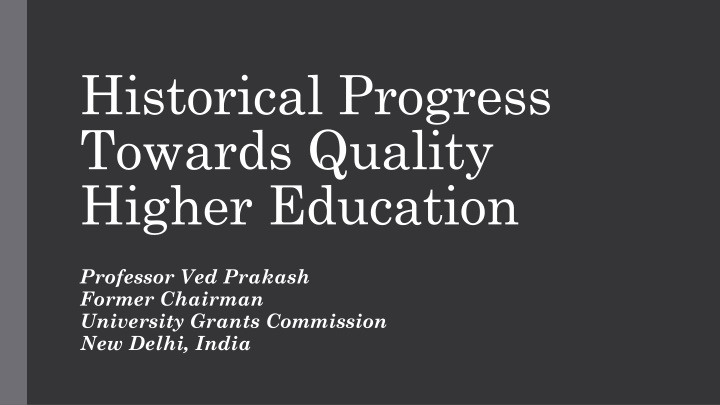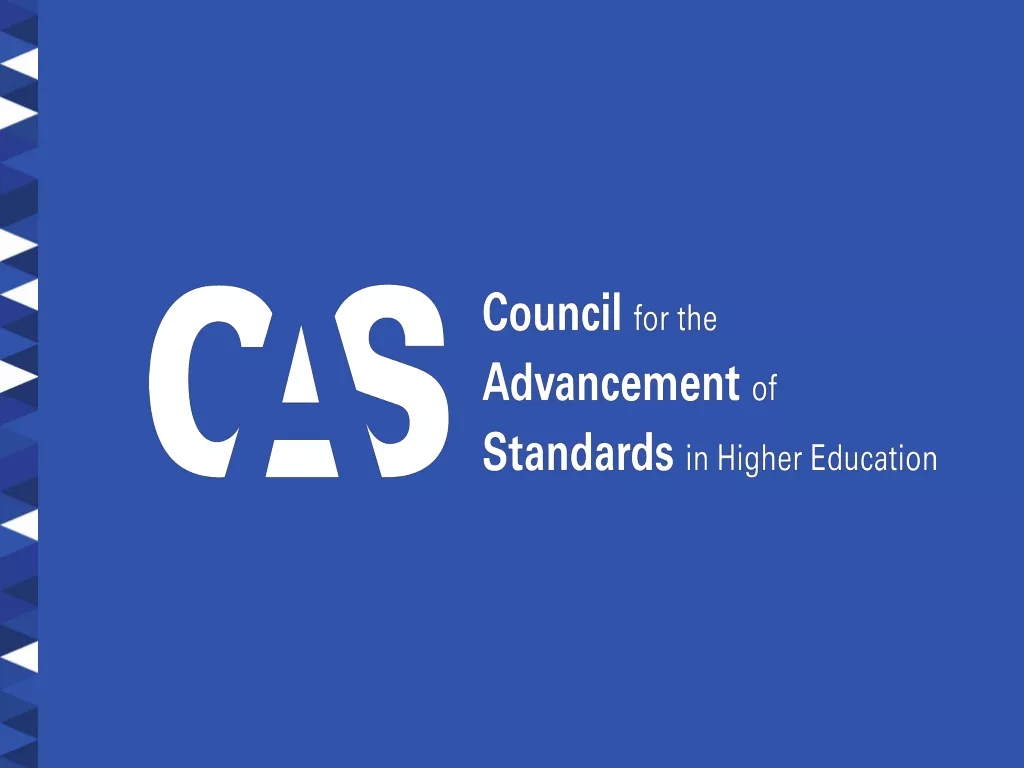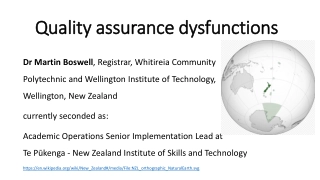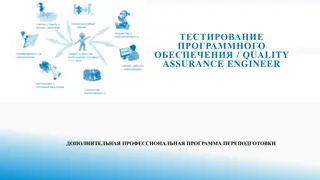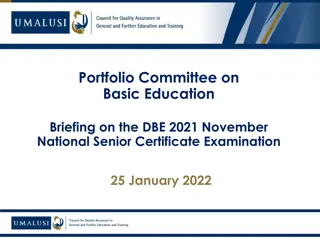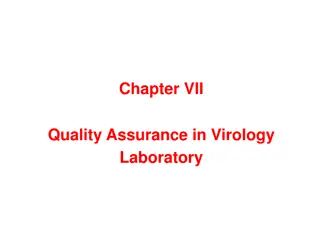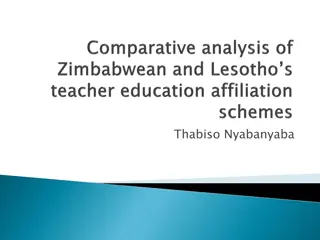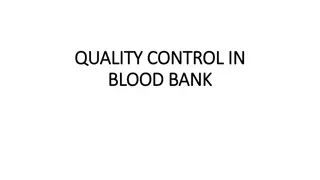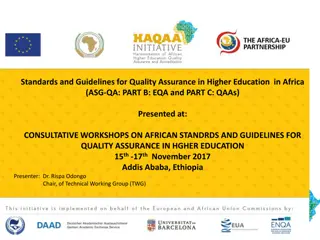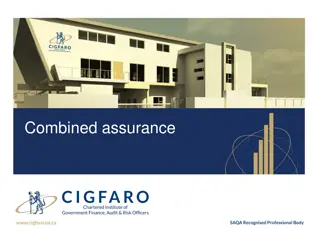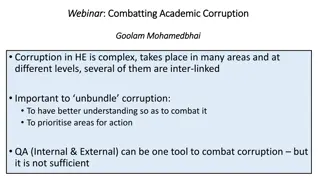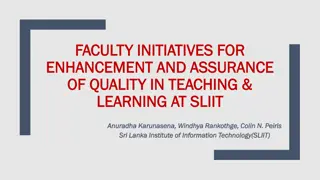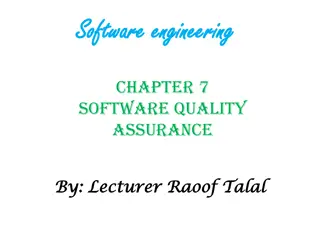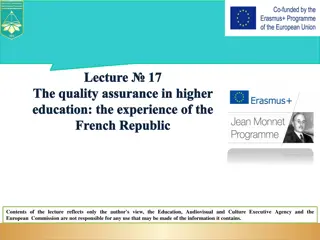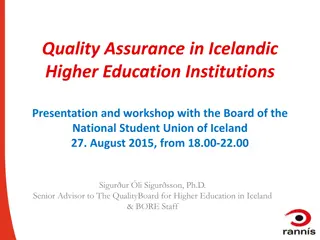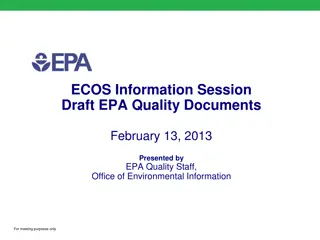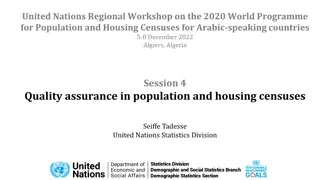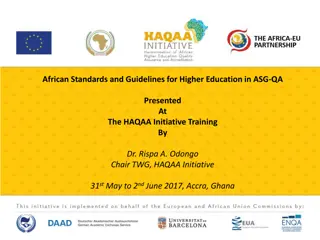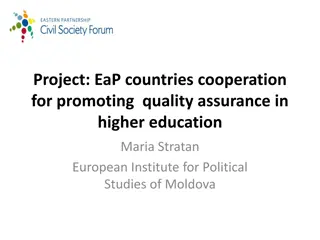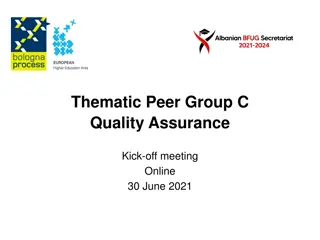Evolution of Quality Assurance in Higher Education
The discourse on quality assurance in higher education has evolved significantly, emphasizing the importance of new knowledge creation and equity. This evolution has led to a focus on qualitative aspects of knowledge, issues with massification, challenges in curricular design, identity crises, and the increasing emphasis on quality management through assessments and accreditation agencies.
Download Presentation

Please find below an Image/Link to download the presentation.
The content on the website is provided AS IS for your information and personal use only. It may not be sold, licensed, or shared on other websites without obtaining consent from the author.If you encounter any issues during the download, it is possible that the publisher has removed the file from their server.
You are allowed to download the files provided on this website for personal or commercial use, subject to the condition that they are used lawfully. All files are the property of their respective owners.
The content on the website is provided AS IS for your information and personal use only. It may not be sold, licensed, or shared on other websites without obtaining consent from the author.
E N D
Presentation Transcript
Historical Progress Towards Quality Higher Education Professor Ved Prakash Former Chairman University Grants Commission New Delhi, India
Significance of the Discourse on Quality Assurance in HE Higher Education
Quality Assurance in HE: An Evolving Discourse Critical for social, economic and technological development. Creation of new knowledge, paramount concern of higher education. Developing young minds to grapple with the emerging concerns and imperatives of future. Facilitator in designing interventions to ensure equity. Platform for breaking the isolation across knowledge domains to usher in multi and interdisciplinary.
Quality Assurance in HE: An Evolving Discourse Blossoming of qualitative aspects of knowledge. Setting up of newer institutions with a predominant focus on quality. Uneven distribution of resources favoring smaller systems. Institutions thrived on patronage of governments.
Quality Assurance in HE: An Evolving Discourse Most countries go for massification for achieving higher GER. Focus on enhancing access made quality of higher education a casualty. Mismatch between demand and supply led to emergence of private entrepreneurship in higher education. Quality-a dominant lacuna concern in most private institutions.
Quality Assurance in HE: An Evolving Discourse Curricular design lack inculcation of spirit of enquiry, courage to question, creativity, problem solving and decision making skills important ingredients of quality teaching and learning. Ensuring access with equity and quality a real challenge. Making available HE at affordable cost - another challenge. Identity and governance crises- other challenges.
Quality Assessment Higher Education
Quality Assessment Increasing emphasis on Quality management in HE Many governments have set up agencies for quality assessment. Voluntary/ mandatory arrangements put in place. Subject assessment, academic audits and innovative approaches mandated. Accreditation with varying academic standards. Some practices are costlier, but all these aim at improving learning and assuring academic standards.
Quality Assessment Quality rankings by some rely upon information gleaned from surveys. Valid and useful academic quality information produced. Most countries seeking effective national framework for academic quality. Degree framework and subject benchmarks with learning outcomes emerging. State mandated external assessment of internal quality assurance.
Quality Assessment Comprehensive program accreditation needed. Internal self evaluation and external review by international experts considered vital. Due attention needed for specific institutional, national and regional context.
Policy Shifts Higher Education
Policy Shifts Looking at quality in transformation (transforming the lives of students & people at large) & renewed focus on governance. Religious, political and social pressures shape up quality across globe. Universities continuously undergoing transformation. System striving hard to respond to changing needs of global economy. Sector witnessing policy shifts & implementation of new strategies. Liberalization created competition for prestige. Modern research universities impacting beyond
Policy Shifts Overriding emphasis placed on increasing societal demands. Universities incentivized for global ranking. Universities becoming business and customer oriented. Commoditization of knowledge - a daunting situation. Universities left to market forces risky.
Major Challenge: Rethinking Quality Higher Education
Major Challenge: Rethinking Quality Quality a social construct- continues to remain a moving target. Quality has both national and international dimensions. Massification meeting social demands, but not employer demands due to skill mismatch. Emphasis should be on core fundamentals and futuristic orientation. Emphasis to be on high quality inputs with exceptional outcomes.
Major Challenge: Rethinking Quality Quality, a question of degree. Quality in relation to assurance and assessment. Distinction between internal and external quality assurance. Continuing professional development of faculty assuming centre stage. Cardinal concern of quality also manifested by the value system. Insightful questions raised about students, faculty, new knowledge, community.
Major Challenge: Rethinking Quality Quality in HE requires multiple interventions. Norms and standards needed for accreditation of institutions and programs. Increasing trend both International and National, towards ranking of HEIs. Weeding out obsolescence in curricular provisions. Quality requires testing of curriculum on higher order abilities. Teacher a powerful instrument to bring out innate qualities of thought & practice.
Major Challenge: Rethinking Quality Placement profile of students a benchmark indicator of quality. Appreciation for quality of research, patents and their commercial exploitation. UNESCO laudable effort to operationalize quality focusing on subject benchmarking.
Emergence of New Quality Assurance Practices Higher Education
Emergence of New Quality Assurance Practices Massification & globalization has changed relationship between state and institutions. Policy makers seeking new means for assuring quality. Global demand for skilled workforce encouraging changes in quality frameworks. Rapid growth leading to privatization posing novel challenges. Traditional Quality frameworks require context specific modifications.
Emergence of New Quality Assurance Practices Competitive forces require institutions to change to new practices. New practices seeking to respond to concern of value for money. Developments leading to innovative forms of academic quality assurance. Challenge to design effective & efficient policy framework to assure academic standards.
National Higher Education Qualification Framework NHEQF
National Higher Education Qualification Framework Some countries still to develop NHEQF. NHEQF provides broad descriptors of academic levels & learning outcomes. Stipulates academic credits based on time taken and academic workload. Focuses on learning outcomes rather than course contents. Provides authentic information about the learner.
National Higher Education Qualification Framework Contributes to an overall national quality assurance system. NHEQF based on a set of criteria approved nationally and comparable with international quality standards needed. NHEQF and subject benchmarking going to become a regulatory device.
Benchmarking in HE Benchmarking a continuous and self improvement tool. Benchmarking a way of comparing, finding and adopting best practices. Successful benchmarking requires institutional willingness. Internal benchmarking. External benchmarking. External collaborative benchmarking.
Benchmarking in HE Idealized best practices approach. Activity-based benchmarking. Vertical benchmarking. Horizontal benchmarking. Benchmarking strengthens institutions in increasingly competitive environments. Quality merits subject benchmarking.
Subject Benchmarking: the New Institutional Audit Higher Education
Subject Benchmarking: the new institutional audit Efforts to operating quality, focusing on subject benchmarking. Describes nature of study and expected academic standards. Offers general guidance for articulating learning outcomes. Provides a picture of what a learner might be expected to know, do and understand.
Subject Benchmarking: the new institutional audit Allows for flexibility and innovation in programme design within an agreed framework. Might require other reference points in some areas like in Vocational programs. Useful reference points in design, delivery and review. Requires listing of vital parameters pertaining to teaching and learning and certifying.
Implementation of Quality Tools Higher Education
Implementation of Quality Tools Universities need to empower youth with skills needed by modern world. Discourses on quality assurance need to focus on Subject specific benchmarking with proper detailing. Broad and diverse curricular provisions. Qualified, competent and caring faculty with academic freedom and institutional support. ICT which expands opportunity and maintains quality. Context specific assessment and accreditation. Pursuit of real efficiencies and financial prudence. Substantial increase in public funding over current expenditure levels.
